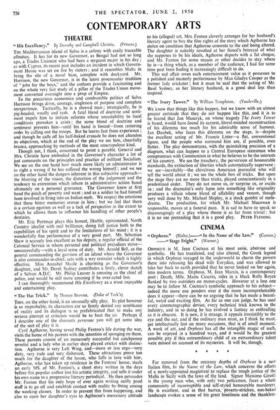44 The Hat Trick." By Thomas Browne. (Duke of York's)
Tins, on the other hand, is an unusually silly play. Its plot however is so improbable, its characters are so firmly denied any semblante of reality and its dialogue is so prefabricated that to make any serious attempt at criticism would be to beat the air. Perhaps if I describe one of the dramatis personae you will get some idea of the sort of play it is.
Cyril Agthorne, having saved Philip Fenton's life during the war, visits the home of his parents with the intention of sponging on them. These parents consist of an immensely successful but catchpenny novelist and a lady who in earlier days played cricket with distinc- tion. Agthorne is very Left Wing, and—more or less ergo—very dirty, very rude and very dishonest.. These attractions prove too much for the daughter of the house, who falls in love with him. Agthorne, who has taken up residence in the Fentons' house, steals an early MS. of Mr. Fenton's, a short story written in the days before this popular author lost his artistic integrity, and sells it under his own name to a progressive literary periodical. He then persuades Mr. Fenton that his only hope of ever again writing really good stuff is to go off and establish contact with reality by4tving among the working classes. In order to prevent this from happening, and also to open her daughter's eyes to Agthorne's mercenary attitude
to his (alleged) art, Mrs. Fenton cleverly arranges for her husband's literary agent to buy the film rights of the story which Agthorne has stolen on condition that Agthorne consents to the epd being altered. The daughter is suitably revolted at her fiancé's betrayal of what she supposes to be his ideals, Agthorne departs with a fat cheque, and Mr. Fenton for some reason or other decides to stay where he is—a thing which, as a member of the audience, I had for some time past been finding it increasingly difficult to do.
This sad affair owes such entertainment value as it possesses to a polished and masterly performance by Miss Gladys Cooper as the former lady cricketer ; but it must be said that the acting of Mr. Basil Sydney, as her literary husband, is a good deal less than inspired.


































 Previous page
Previous page